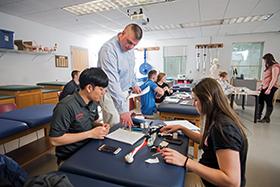Our new Online Course Design Certificate Program is designed to train or prepare curriculum instructors with the skills and competencies beneficial for higher education faculty and professionals who design and deliver virtual learning experiences. Our fully online 4-course curriculum applies research and evidence-based teaching practices, integrates the International Society of Technology in Education (ISTE) standards, applies Quality Matters (QM) best practices, and focuses on skills necessary to design relevant, rigorous, and accessible virtual learning experiences for these changing times.
Students completing the certificate program will be proficient designers of high-quality virtual instruction. Graduates will have skills useful for full or part-time work as:
• Higher Ed blended and fully online Instructor
• Educational Product and Supply Professional
• HR Learning and Development Specialist or Corporate Trainer
• Freelance Teacher and Coach
• Curriculum Designer Lesson Plan Supplier
• Instructional Designer
Program Coordinator: Ms. Tracy Charbonnier
Accordion Content
Admissions Requirements
All applicants who wish to enroll in the Online Course Design Graduate Certificate Program will follow the standardized procedure for completing the graduate school application forms required for admission to all graduate certificate programs. A bachelor's degree is required for admission to the program.
- Completed Graduate Certificate application (apply online http://10t.vitosdelinh.com/admissions/graduate/apply)
- A Bachelor’s degree from an accredited college or university
- Personal Statement
-
Please begin by addressing how your personal background and experiences influenced your decision to pursue this certificate. Take some time to think about yourself as a learner when you answer the questions below.
- Describe the skills and knowledge you wish to obtain in this certificate program.
- Discuss the variety of applications that you use on a regular basis and your familiarity with each application. For example, applications could be web browser(s), Office Productivity tools (e.g. Microsoft Office), Design & Creativity (e.g. Adobe Creative Suite), Software Development, Management and/or Workflow.
- When you are faced with a technology issue, how would you work through this problem?
-
- Official transcripts for all undergraduate and graduate work
- Resume
*Rolling admission for fall, spring and summer enrollment. Applications should be complete to allow adequate time for processing before the start of the semester (usually six weeks prior to the beginning of classes).
Curriculum
VRED 551 – Learning Theories and Theoretical Foundations of Course Design
The planning of educational experiences should be guided and supported by the science of learning and instruction. In this course, you will explore the science of learning theories (Behaviorism, Constructivism, Cognitivism & Connectivism, and Andragogy), the science of instruction including technology’s role in learning, and a framework for implementation. You will recognize your own epistemological or philosophical teaching position; describe the main theories of learning and discuss their implications for teaching and integrate these ideas into a personal strategy for the teaching of your subject.
VRED 552 – Developing Outcomes and Assessments for an Online Learning Environment
Prerequisite: VRED 551. Building off VRED 551 Learning Theories and Theoretical Foundations of Course Design, participants will use the Understanding by Design framework as a guide to develop hybrid and fully online course outcomes and assessments. Using a systematic approach, learning science strategies and education technology integration models (e.g., SAMR, Triple E framework and/or TPaCK), participants will design performance-based activities and projects to measure student learning implementing online design best practices. Learning experiences for this course will model discussion forums, peer collaborations and web conferencing, using both LMS features and web-based resources. Offered fall, spring, summer.
VRED 553 – Building Online Community and Developing Engaging Learning Activities
Prerequisite: Completion of VRED 551. In this course you will discover how to build and foster community with your students in your online courses and develop meaningful, engaging learning activities that facilitate students reaching course goals and learning outcomes. You will discover how to use learning management system functions and free online tools and mobile applications in the design of your learning activities.
VRED 554 – Online Course Design Certificate Capstone Experience
Prerequisites: Completion of VRED 551, 552, and 553 . The capstone course in the Online Course Design Certificate program assists students in successfully completing the creation of a high-quality online learning environment to deliver content to a specific audience, building on their work from the preceding courses in the certificate program. The project will demonstrate the ability to create relevant, rigorous, and coherent courses or training that support learner engagement, curiosity, and excitement. The final project will utilize research and evidence-based practices and model digital citizenship.
Minimum Credits: 12
***For the most up-to-date information regarding course descriptions, please visit our University Catalog.



